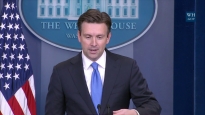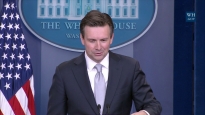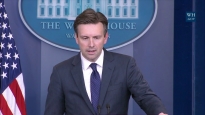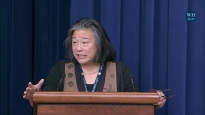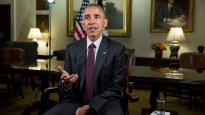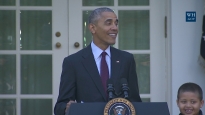Creating Jobs Through New Small Business Initiatives
February 05, 2010 | 7:58 | Public Domain
President Obama announces the expansion of two SBA lending programs designed to help small businesses in a difficult credit market and encourage them to create new jobs in a visit to Lanham, MD.
Remarks by the President on Jobs with Small Business Owners
Oasis Mechanical Contractors
Lanham, Maryland
12:42 P.M. EST
THE PRESIDENT: Good afternoon. And I appreciate the warm welcome from Rick Cummings and Dennis Bean and all the folks at Oasis. Thank you so much. These guys are experts in heating and cooling systems -- though, having spent some time in Washington, I actually am already very familiar with hot air I have to say. (Laughter.)
That, by the way, does not apply to the head of the Small Business Administration, Karen Mills, who's here today. And Karen has focused like a laser on helping small businesses not only survive but to thrive amidst the economic storm of the past two years.
We're also joined here by Ruth Gresser, who's the owner and chef at Pizzeria Paradiso. And I'm a little upset with Ruth because she did not bring samples, but Reggie Love has testified that the pizza is outstanding -- she's got restaurants in Washington. And also, Will Polak, who's the owner and operator of the Potomac Riverboat Company in Alexandria, Virginia. There's Will.
These folks know, as every living soul in America does, that these have been a rough couple of years for our economy and for our country -- the deepest downturn since the Great Depression ripped through our economy, costing more than 8 million jobs and rocking businesses, large and small.
And that's why we took some very tough steps, in some cases some unpopular steps, when I took office to break the back of this recession. And today we received additional news suggesting that we are climbing out of the huge hole that we found ourselves in. Last January, the month I took office, almost 800,000 Americans lost their jobs. Today we learned the job losses for this January were 20,000. The unemployment rate dropped below 10 percent for the first time since the summer. Manufacturing employment grew last month for the first time in three years, led by increased activity in the production of cars and trucks and auto parts.
These numbers, while positive, are a cause for hope but not celebration, because far too many of our neighbors and friends and family are still out of work. We can't be satisfied when another 20,000 have joined their ranks and millions more Americans are under-employed, picking up what work they can.
It is encouraging the job loss in January was a small fraction of what it was a year ago and that the unemployment rate last month went down and not up. Understanding that these numbers will continue to fluctuate for months to come, these are welcome, if modest, signs of progress along the road to recovery.
Now, even as we take additional steps to hasten that recovery, we know that there are limits to what government can do to create jobs. The true engine of job creation will always be businesses. What government can do is fuel that engine by giving entrepreneurs and companies the support to open their doors and to expand and to hire more workers. That's exactly what this administration intends to do and what we've been doing working with the SBA and Karen Mills.
We're starting with small businesses because that's where most of the new jobs do. Over the past 15 years, small businesses have created roughly 65 percent of new jobs in America. These are companies formed around kitchen tables and family meetings; formed when an entrepreneur takes a chance on a dream; formed when a worker decides it's time she became her own boss. And it's worth remembering every once in a while, a small business becomes a big business, and then changes the world.
And that's why, last week, I proposed a new small business tax credit -- $5,000 for every new employee you hire this year. And a couple of these folks here, small business owners who I talked to, said they'd be interested in using that tax credit.
This week I proposed a new small business lending fund that would take $30 billion of the fund originally used to rescue big banks on Wall Street, and use it to provide lending capital to community banks on Main Street. And I know that we've got Capital One Bank here that's been a lender to Oasis and --
AUDIENCE MEMBER: Capital Bank --
THE PRESIDENT: Capital Bank -- excuse me -- and we appreciate the good work that you've done supporting this company.
Under Karen Mills, SBA has increased loan guarantees and reduced fees, steps that have increased SBA lending by 86 percent. And we've called for legislation to increase SBA loan limits to allow us to guarantee loans of up to $5 million compared with $2 million now.
And today I'm taking yet another step to assist small business owners get the capital that they need to grow and to hire. I'm proposing legislation that allows firms to refinance their commercial real estate loans, their mortgages under the SBA.
Right now even companies with great credit histories are facing challenges refinancing at what are historically low rates. Property values have fallen and lending has dropped. As a result, many businesses that would otherwise survive this downturn are at risk of defaulting, which in turn will lead to even lower property values and less lending, not to mention lost jobs.
In addition, I'm also proposing that we increase the limits for SBA loans used for lines of credit and working capital, something that I know could benefit Ruth's business and countless others.
The truth is the economy can be growing like gangbusters for years on end and it's still not easy to run a small business. It's not easy to stay ahead of your competitors; it's not easy to keep your costs down, to do right by your employees, to constantly innovate and adapt in a changing world. Talking to Ruth, she reminds me it's not easy keeping up with health care costs, and so Ruth is very anxious to see health reform passed so that small businesses can pick up the cost for their employees.
And in this deep and lasting recession, a hard job has been that much harder because for much of last year people weren't buying and customers weren't calling and banks were not lending. But even in the face of these obstacles, even in these tough times, all across the country there are people like Rick and Dennis and Ruth and Will who haven't given up. You guys wake up every day and seek a way to safely navigate these troubled waters to fulfill your obligations to your families and to your employees and your customers. And in that determination, that resolve, you embody what's best in America and you keep making America stronger.
Next week, Congress will start debating many of the jobs proposals I've outlined today and in recent days, many of the proposals to benefit small business, many of the proposals to spur hiring. If there are additional ideas from either party, I'm happy to consider them, as well. But what I hope -- what I strongly urge -- is that we work quickly and we work together to get this done. America's small businesses are counting on us.
So thank you very much, everybody. And thank you, guys.
END
12:50 P.M. EST
|
November 30, 2016
|
November 29, 2016
|
November 29, 2016
|
November 28, 2016
|
|
November 28, 2016
|
November 25, 2016
|
November 24, 2016
|
November 23, 2016
|
- &lsaquo previous
- …
- 5
- 6
- 7
- 8
- 9
- 10
- 11
- 12
- 13
- …
- next &rsaquo
